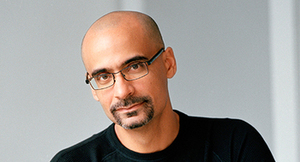| « Travel Writer Kathleen Wheaton Reads @ Evanston Public Library | Turkish Poet Bejan Matur Reads @ Poetry Foundation » |
Events Tue Oct 15 2013
Brief Wondrous Hour with Junot Diaz at The Chicago Humanities Festival
 Last Sunday evening, as part of this year's Chicago Humanities Festival, Pulitzer-Prize winning author Junot Diaz sat down with Wait, Wait... Don't Tell Me! host Peter Sagal to a packed audience at Northwestern's Cahn Auditorium. "Welcome to the presentation of two bald guys from Jersey," said Sagal.
Last Sunday evening, as part of this year's Chicago Humanities Festival, Pulitzer-Prize winning author Junot Diaz sat down with Wait, Wait... Don't Tell Me! host Peter Sagal to a packed audience at Northwestern's Cahn Auditorium. "Welcome to the presentation of two bald guys from Jersey," said Sagal.
If only conversations with bald guys from New Jersey were always this intellectually stimulating.
For those who have been living under a literary-news-free rock, a brief introduction of Junot Diaz might be necessary. The author of three critically acclaimed books--Drown, The Brief Wondrous Life of Oscar Wao, and This Is How You Lose Her--Diaz is also a recipient of a MacArthur "Genius" Grant, a National Book Award finalist, and a New York Times best-selling author. Somehow, he finds time to teach at MIT.
His books are usually described as explorations of the immigrant experience, and Sagal approached this and other well-known mainstays of Diaz's fiction: the crux of Dominican identity, the examination of marginal communities, and his unique blend of gritty realism and escapism via geek-culture. Diaz answered all his questions with the cadence of a street hustler who has read way too much Frantz Fanon. He might be one of the few authors today who can drop the F bomb and reference Benedict Anderson all in one breath--and get away with it.
But here is the really intoxicating thing about Junot Diaz: he seems to be aware that it would be easier to limit his creative project to a niche genre-mainly, "ethnic writing" or, to be more specific, "Latino writing"--but he refuses to confine himself within those boundaries. As he said on a question about his extensive focus on Dominican identity, "One book cannot represent 10 million people...[it] can open up a conversation," before explaining that he's interested in using local phenomena to access bigger topics. With regards to his characters, their Dominican-ness is a way to delve into the issues of masculinity that plague all socio-cultural communities. When speaking about his love of fantasy, Diaz expanded on what these imaginary worlds did for him beyond escapism. On a personal level, it was a way to keep seeking other worlds after his youthful expectations of the US were shattered by its reality. On the other hand, as the 80s ravaged the Latino community with war, poverty, political instability, AIDS, and other calamities, genre fiction allowed him a space to think about the political present.
Though he never used the phrase, I couldn't help but think of the famous feminist rallying cry, "the personal is political," as Diaz continued to expound on how the particular can point to a universal experience. As the evening went on, the discussion turned overtly political as he explained the ill consequences of institutionalized racism, male privilege, and the strain of anti-intellectualism in the US. "Systems have to be confronted," said Diaz. "To pretend one group is excused from [the system of white supremacy] is absurd. To pretend we don't have a sexual economy based on race is absurd."
Despite its focus on society's failures and questionable triumphs, the night felt far from grim or fatalistic. Both Sagal and Diaz kept the conversation nimble and jovial. There was an intimacy with which Diaz responded to the audience's questions that ranged from racism in the Latino community to the plight of young men of color. Even as Diaz counted the numerous attacks on literature today, he highlighted the painstaking work that teachers, booksellers, and community leaders have done to keep books alive. "Reading has survived far better than expected," he admitted.
One of the last questions of the night was one every author has probably fielded: What advice do you have for an aspiring writer? For a professional author, Diaz's answer was surprising yet refreshing. "Society has convinced kids that art is a career to pursue," he said. "What needs to be pursued is passionate engagement with the world. The you living in the world will write the books I'll want to read."
There is so much more that I would love to include in this recap, so much that I didn't do justice. For now, I think I'll step back from the keyboard and heed Junot Diaz's advice. Go forth, readers, and engage with the world.
Image courtesy of the Chicago Humanities Festival website.










David Pickett / October 17, 2013 9:40 AM
Watch the video of the Junot Diaz program on the Chicago Humanities Festival's YouTube channel: http://www.youtube.com/watch?v=TA8X6TUA83k